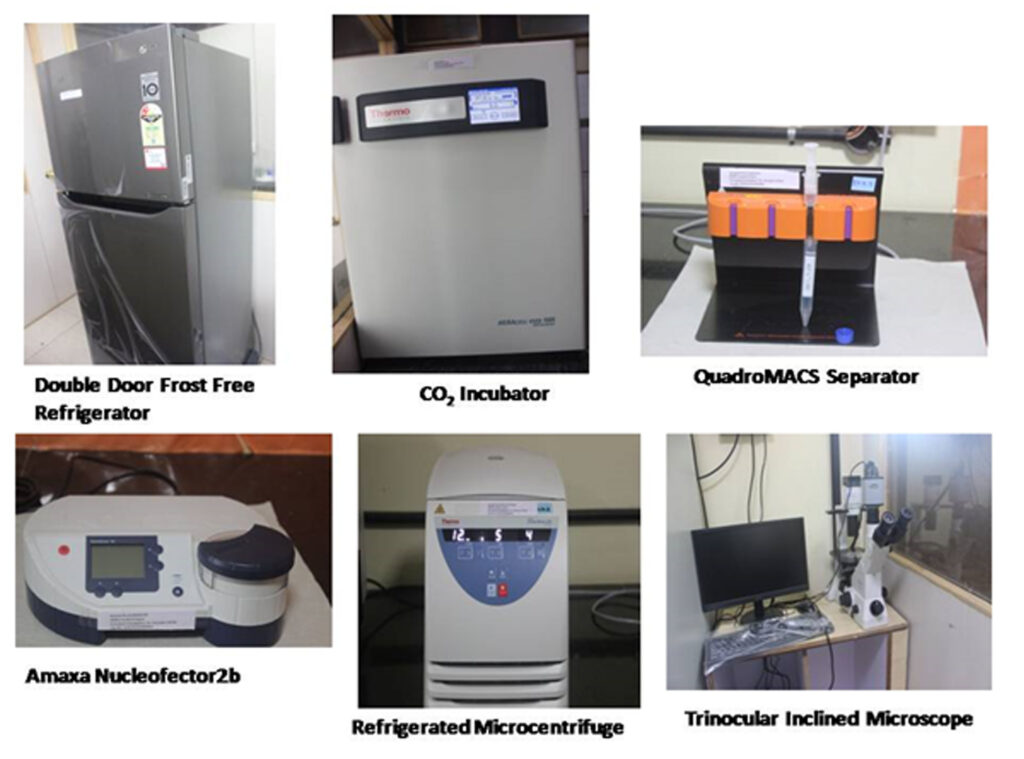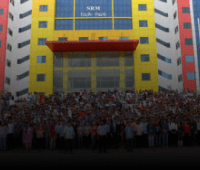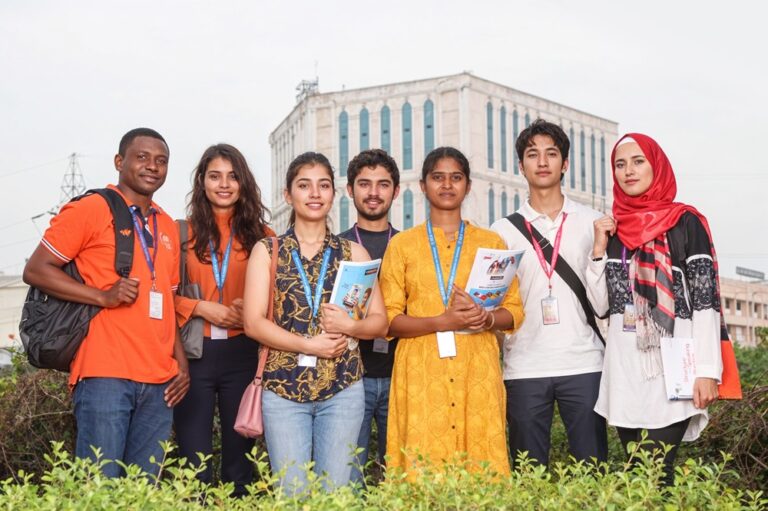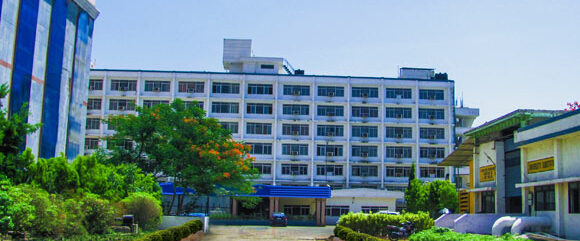
Cancer Immunology and Gene Editing Technology Lab
- Home
- Faculty of Engineering & Technology
- Department of Biotechnology
- Cancer Immunology and Gene Editing Technology Lab
Cancer Immunology and Gene Editing Technology Lab
Cancer immunotherapy has emerged as a promising strategy for the treatment of a broad spectrum of malignancies, ranging from haematological to solid tumours.
Cancer immunology is an interdisciplinary branch of biology that is concerned with understanding the role of the immune system in the progression and development of cancer. The most well-known application is cancer immunotherapy, which uses the immune system as a treatment for cancer. Cancer immunosurveillance and immunoediting are based on protection against the development of tumours in animal systems and the identification of targets for immune recognition of human cancer. Gene editing is a type of genetic engineering in which DNA is inserted, deleted, modified, or replaced in the genome of a living organism. Unlike early genetic engineering techniques that randomly inserted genetic material into a host genome, genome editing targets the insertions at site-specific locations.

Specifications
All the equipments were purchased through SERB Funded Project (File No. ECR/2016/000965) under the Principal Investigation of Dr. Koustav Sarkar
- Double Door Frost Free Refrigerator
- CO2 Incubator
- QuadroMACS Separator
- Amaxa Nucleofector2b
- Refrigerated Microcentrifuge
- Trinocular Inclined Microscope
- -200C Freezer
- Biosafety Cabinet A2 type workstation
- Magnetic Separation Stand
- Vortex mixer
- 3D Shaker
List of Ongoing Research Projects:
- Mechanistic association between Chronic Obstructive Pulmonary Disease (COPD) and lung cancer: Role of epigenetic modifications of inflammatory genes
- Influence of epigenetic regulators in bridging the link between cancer and coronary artery disease (CAD) in accordance with ageing.
- During the progression of breast cancer, STAT1 mediates epigenetic regulation of T helper (Th) cell differentiation.
- Xeroderma Pigmentosum, Complementation Group G (XPG) mediated Epigenetic Regulation of T Helper Cell Differentiation during Breast Cancer
- Doxorubicin induced dendritic cell mediated anti-tumor activity in Non-small cell lung carcinoma
List of Completed Projects:
- As the principal investigator (PI):
The title of the project: “Wiskott Aldrich Syndrome protein (WASp) mediated epigenetic regulation of T helper (Th) cell differentiation linked to malignancies through R-loop modulation”. Funding Agency: SERB, DST, Govt. of India. Sanctioned amount: Rs. 44,45,210/-
- As Co-PI:
The title of the project is “Therapeutic potential of Nrf2 activators on endoplasmic reticulum stress-induced endothelial dysfunction in diabetes”. Funding Agency: SERB, DST Govt. of India Sanctioned amount: Rs. 50,54,200/-
- Other Projects:
- CCCTC-binding factor (CTCF) mediated epigenetic regulation of T helper (Th) cell differentiation during lung carcinogenesis
- Wiskott Aldrich Syndrome protein (WASp) mediated epigenetic regulation of T helper (Th) cell differentiation linked to lung cancer through the modulation of N6-methyladenosine (m6A) RNA methylation
- Role of epigenetic modifications of inflammatory genes in chronic obstructive pulmonary disease (COPD)
- R-loops suppression evokes genomic stability in lung cancer
- Role of Wiskott Aldrich Syndrome Protein (WASp) in epigenetic regulation of B lymphocytes development and differentiation during lung carcinogenesis
- Xeroderma Pigmentosum, Complementation Group F (XPF) mediated epigenetic regulation of T helper cell differentiation during breast cancer
- Immunomodulatory role of Diospyros peregrina fruit protein (DFP) in breast cancer by utilising macrophage-mediated antigen presentation and T helper cell (Th) differentiation
- Enhancer zeste homolog 2 (EZH2)-mediated T helper (Th) cell differentiation is linked to lung cancer through the epigenetic regulation of Yin Yang1 (YY1)
- Diospyros peregrina fruit protein mediated immunomodulation of lymphocytes isolated from the blood of breast cancer patients
- Influence of epigenetic regulators in bridging the link between cancer and coronary artery disease
- Study of signalling pathways involved in cancer preventive activities mediated through the fruit Diospyros peregrina
- Wiskott Aldrich Syndrome Protein (WASp)-mediated epigenetic regulation of c-MYC during NOTCH1-induced malignancy
- Bio-physicochemical characterization of a plant protein having a cancer preventive role isolated from the unripe fruit of Diospyros peregrina
- Neem leaf glycoprotein facilitates lung carcinoma-associated antigen specific anti-cancer immune responses utilising macrophage-mediated antigen presentation and induction of type 1 cytokines coupled with nitric oxide production.
- Involvement of R-loop regulatory molecules in naive CD4+ T helper cells
- Process for isolating the active ingredients from different parts of the unripe fruit of Diospyros peregrina and their characterization to define the cancer-preventive functions
Profile
One of the principal approaches to cancer immunotherapy is the transfer of naturally occurring or engineered tumor-specific T-cells into patients, a process called “Adoptive Cell Transfer”, (ACT). Allogeneic T-cell development is dependent on the use of a gene-editing tool to modify donor-extracted T-cells and prepare them to specifically act against tumour cells with enhanced function and durability and the fewest side effects. In this context, CRISPR technology can be used to produce universal T-cells equipped with recombinant T- cell receptors (TCR) or chimeric antigen receptors (CAR) through multiplex genome engineering using Cas nucleases. The robust potential of CRISPR-Cas in preparing the building blocks of ACT immunotherapy has broadened the application of such therapies, and some of them have gotten FDA approval. In this lab, we are mainly working in the field of immuno-oncology associated with CRISPR/Cas9 technology.
Contact Persons
Dr. Koustav Sarkar
Research Assistant Professor
koustavm@srmist.edu.in
Ms. Sudeshna Rakshit
Research Scholar
sudeshns@srmist.edu.in
Ms. Geetha S.
Research Scholar
gs6491@srmist.edu.in
















